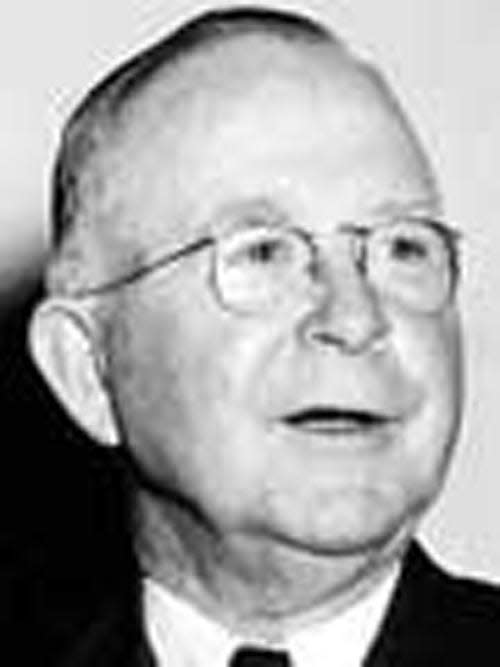Bridges: One-time Amarillo mayor Ernest Thompson recognized as expert in oil production
Not everyone is destined to win all the races they race or the fights that they fight. And on some special select occasions, some of those daring souls are recognized for what they do achieve and the importance of the work to which they dedicate their lives. One of those figures is one-time Amarillo mayor Ernest O. Thompson. Thompson was denied his attempt to become governor decades ago, but his impact as a Railroad Commissioner still has a strong impact on modern Texas.
Thompson was born in Alvord, a small community in Wise County, in 1892. In 1902, the family moved to Amarillo, where his father ran a drug store. As a youth, he was considered bright and hard-working. And he always had an eye for opportunity, cleverly coming up with ways to find work or talk his way into a job.

He graduated from the University of Texas with a law degree in 1917. He joined the army in the midst of World War I, serving in the infantry. In 1918, Thompson was cited for his innovative techniques with mass, coordinated machine gun fire and promoted to lieutenant colonel. He returned to Amarillo in 1919 to practice law. Thompson was one of the organizers of the American Legion, a group of veterans dedicated to helping veterans.
In 1928, he ran for mayor, pledging to cut utility rates and won easily. In 1932, Gov. Ross Sterling appointed Thompson to the Texas Railroad Commission.

The role of the Railroad Commission steadily expanded from railroad hauling rates to regulating oil pipelines and oil and gas production by World War I. It expanded to other forms of energy and transportation in the 1920s. The wild East Texas oil field was producing a fortune, but waste and reckless drilling threatened its long-term stability. Drilling too much too quickly for too long had ruined the production yield in oil fields in other parts of the country, even though the oil was still available. Overproduction had caused East Texas oil prices to drop 90%.
Thompson introduced a series of measures that limited production and oversaw safety measures, all designed in a way that protected the interests of smaller producers and still protected the interests of corporations. In a short time, prices stabilized, safety began to improve, and production remained sustainable. In appreciation for his efforts, Gov. James V. Allred of Wichita Falls appointed Thompson colonel in the Texas National Guard in 1936. Though Thompson was not a producer himself, he was recognized globally as an expert on oil production. In 1937, President Franklin D. Roosevelt sent him as the American delegate to the World Petroleum Conference in France.
In 1938, he decided to run for governor. Thompson started the primary season as the prohibitive favorite to succeed Gov. Allred. Initially, his biggest opponent for the Democratic nomination was William McCraw, the state attorney general and a former Dallas prosecutor, and corporate attorney Tom Hunter of Wichita Falls. A slew of other candidates joined in, with most of the debate centered on the lingering effects of the Great Depression and calls for aid to schools and the poor and a state teacher’s pension.
That spring, W. Lee “Pappy” O’Daniel, a popular Fort Worth-based radio broadcaster whose noon broadcasts of popular country music and his homespun humor won him thousands of fans, jumped into the race. A master showman, Pappy O’Daniel drew huge crowds to his campaign rallies with his wit and free concerts performed by his Light Crust Doughboys band. Few polls were conducted, but it was clear who had the advantage. Thompson held onto hopes that he could enter the usual runoff. But O’Daniel won the July primary with 51% of the vote, with Thompson finishing a distant second with only 21%. O’Daniel then went on to win the general election with an astounding 97% of the vote.
Thompson was still on the Railroad Commission but decided for a re-match against O’Daniel in 1940. The result was about the same, with O’Daniel winning 54% of the vote to 21.6% for the runner-up Thompson.
When World War II erupted, Thompson, now nearing 50, rejoined the army. As the Allies needed a steady supply of fuel as much as they needed troops in the field, Thompson was sent back home to his duties on the Railroad Commission to ensure a steady flow of oil and natural gas to the military. Texas was a key part of this effort.
Thompson was elected to three more terms on the Railroad Commission after the war. Gov. Allan Shivers appointed Thompson as general of the National Guard in 1952.
As the years advanced and his health started to decline, Thompson decided to retire. In January 1965, he formally stepped down from the commission. He built a steady list of honors for his work. Amarillo had named a park in his honor, and Alvord placed a historical marker in the community. And to further honor of his years of service, the State of Texas renamed the old Austin Daily Tribune Building after Thompson later in 1965. He died just 18 months later at age 74. His 33 years on the Railroad Commission is still the longest in state history. The 11-story building named for him is today home to the Texas Department of Licensing and Regulation.
Ken Bridges is a writer, historian and native Texan. He holds a doctorate from the University of North Texas. Bridges can be reached by email at drkenbridges@gmail.com.
This article originally appeared on Amarillo Globe-News: Bridges: Amarillo mayor Ernest Thompson's key role in Texas oil, gas
